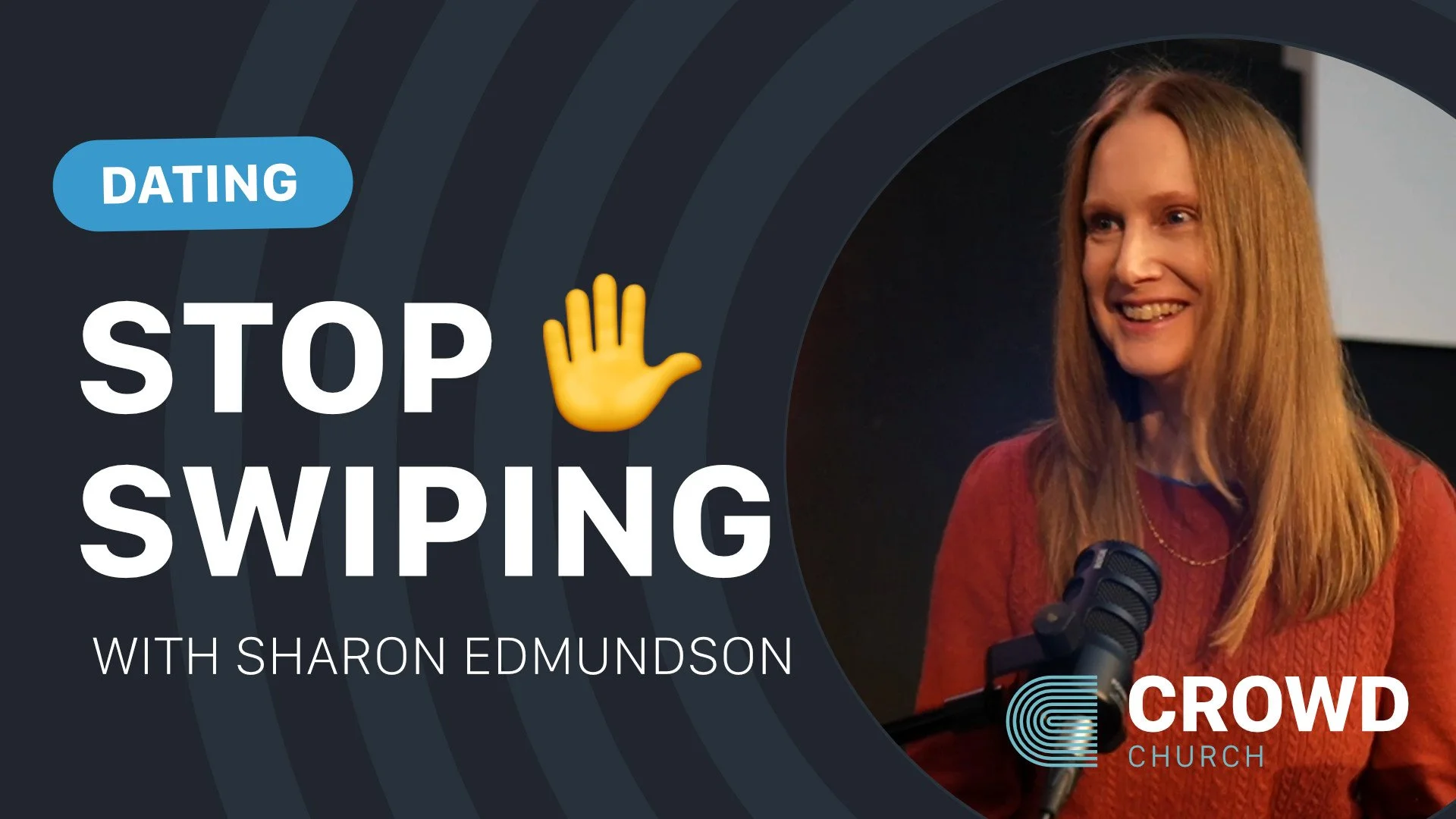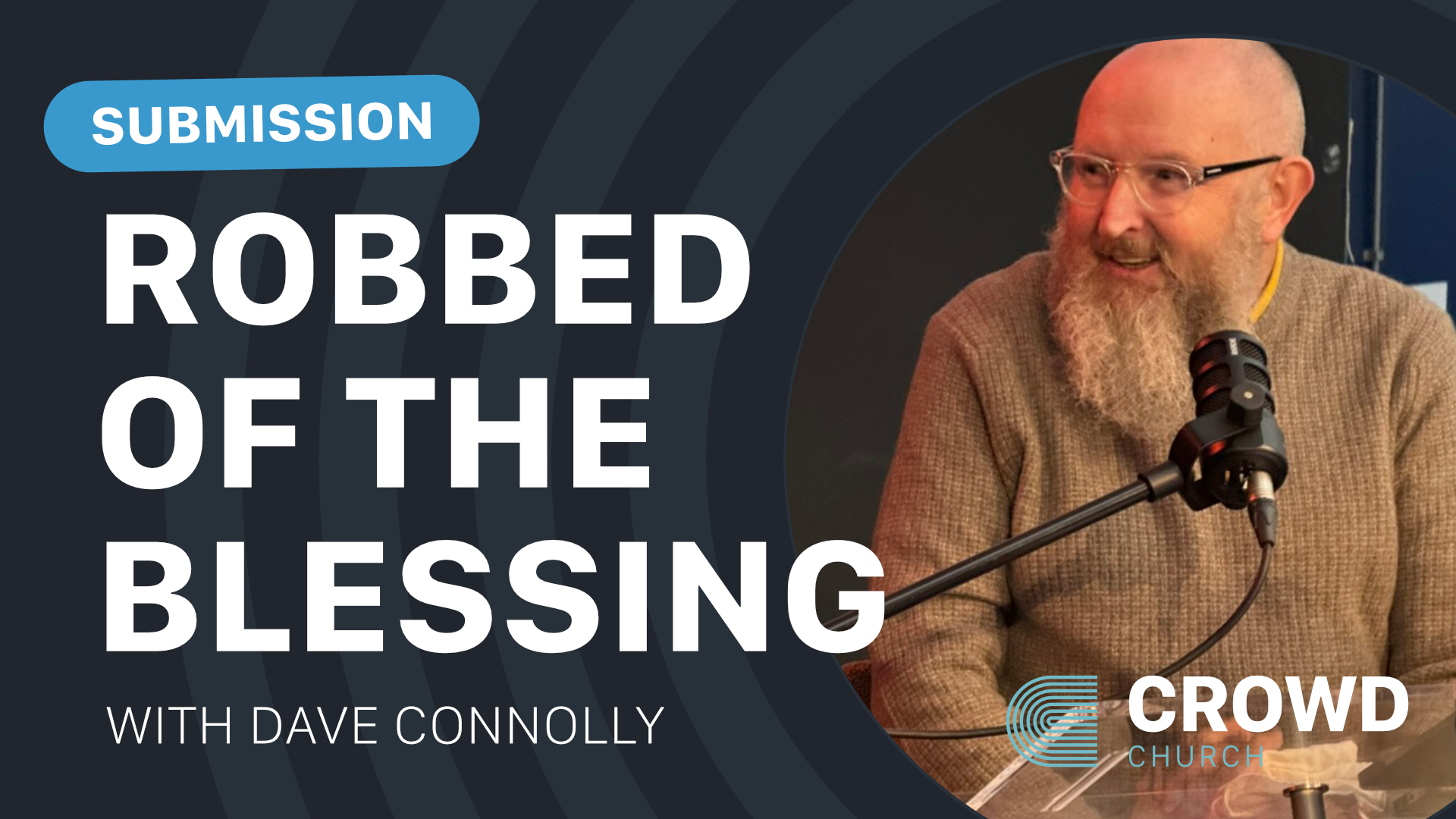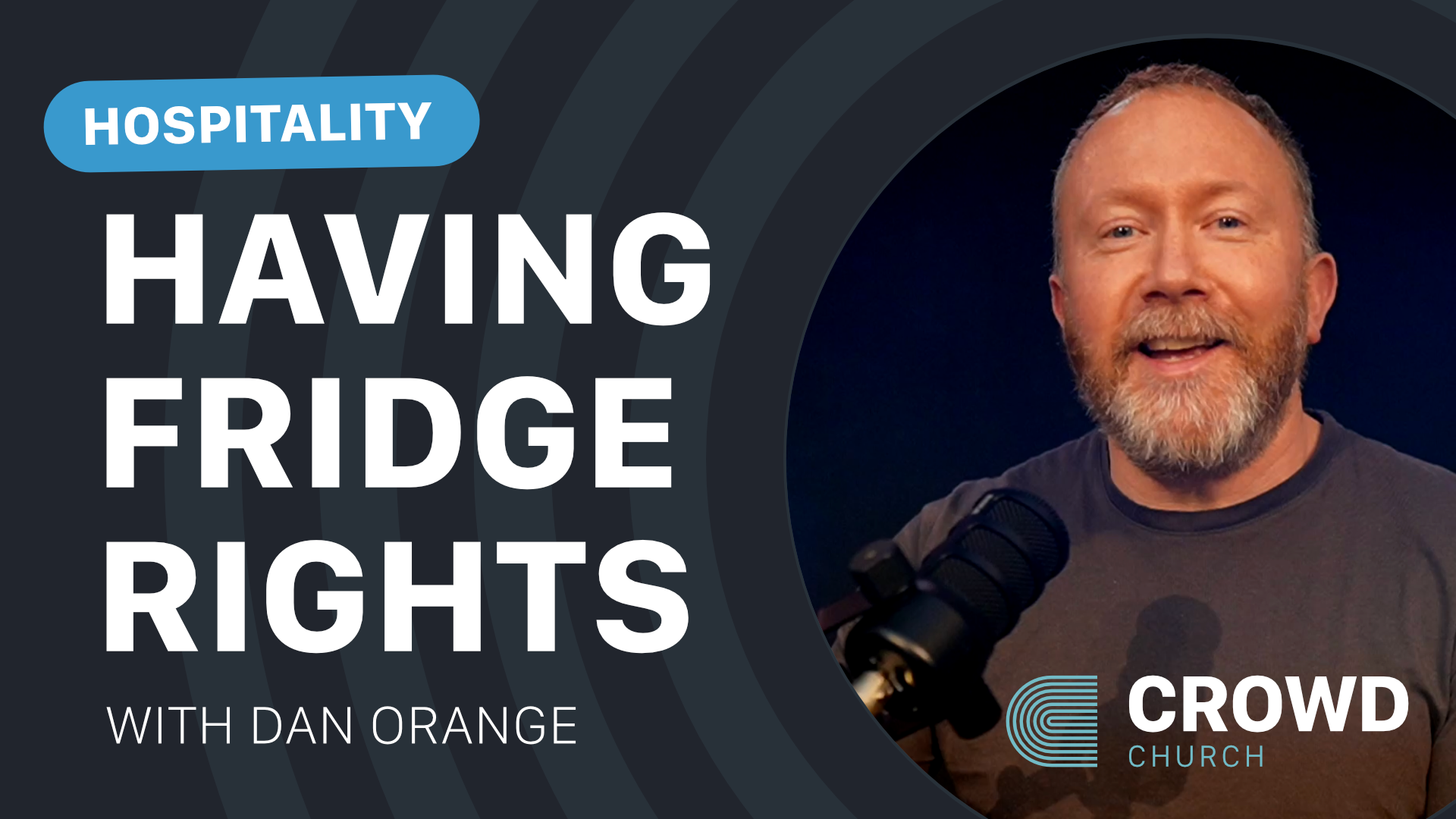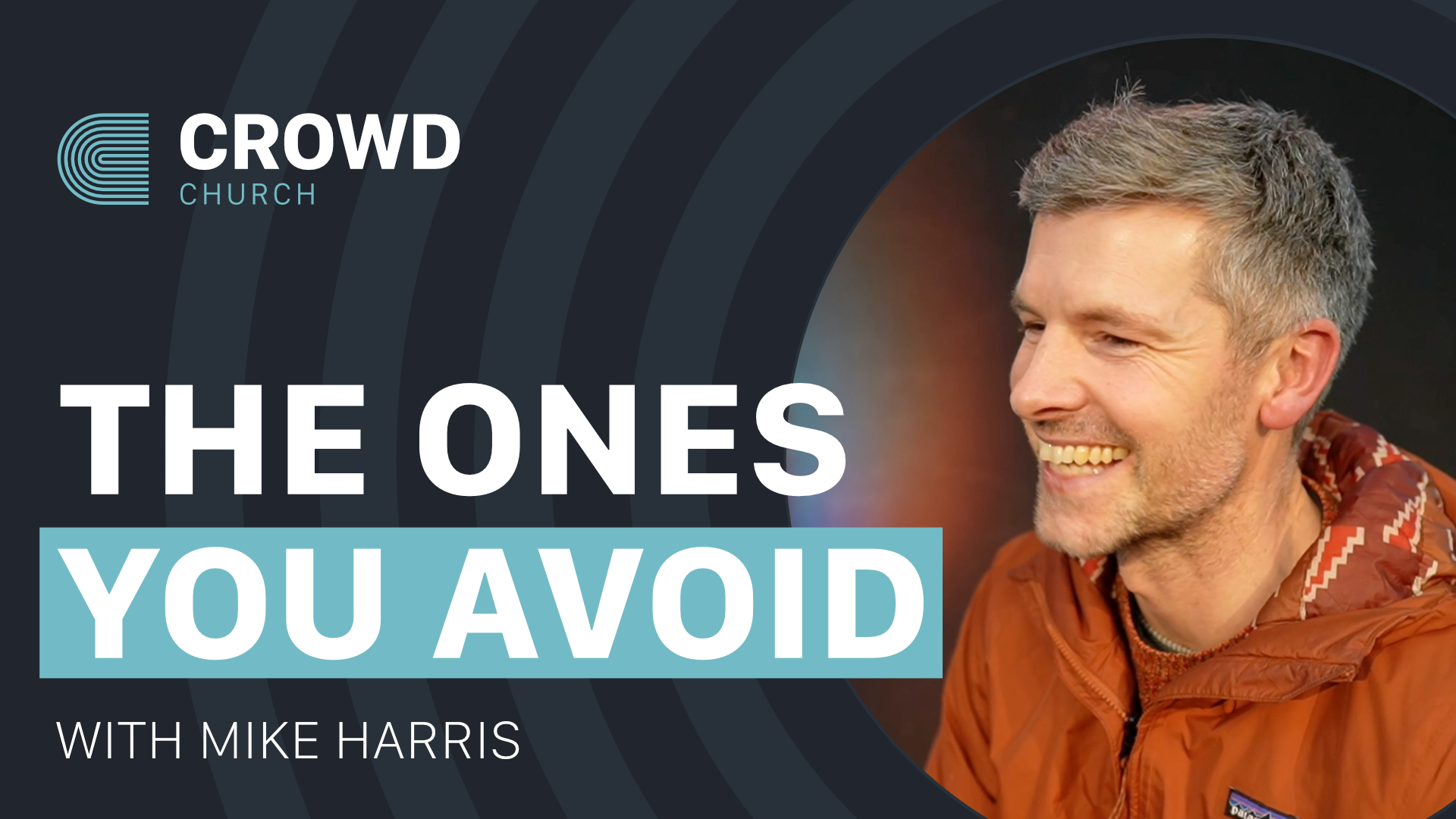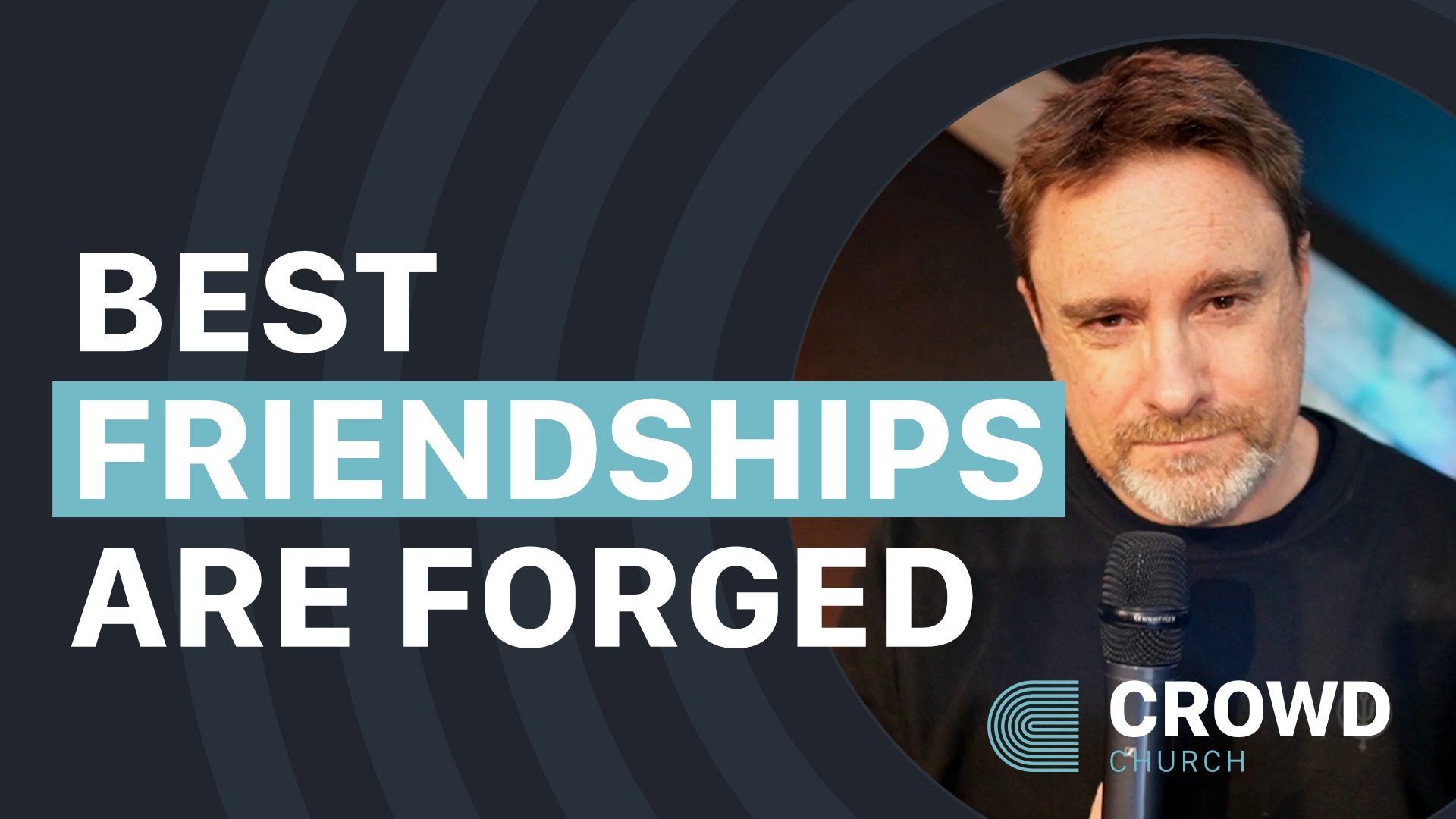The Unleavened Life: Finding Freedom By Carrying Less (Sacred Rhythms Part 3)
Finding Freedom By Carrying Less
Ever feel like you're drowning in stuff you don't actually need? Or maybe you've tried every decluttering hack going, only to find yourself back where you started six months later?
Pete Farrington explores something far deeper than Marie Kondo's "spark joy" method. Drawing from the ancient Feast of Unleavened Bread, Pete reveals why true freedom comes not from rearranging our external chaos, but from identifying what's actually mastering our hearts. It's not about becoming a minimalist or selling everything - it's about discovering what's really weighing you down spiritually.
When Good Things Become God Things
Before we jump to solutions, let's be honest about what's really happening. We live in a culture that promises freedom through acquisition - more stuff, more experiences, more followers, more everything. But Pete challenges this completely:
"Almost everything we do and create and strive for is an attempt to satisfy a hunger that we don't really want to admit is actually a hunger for something we've never tasted."
The Feast of Unleavened Bread wasn't just about different bread recipes. When God commanded the Israelites to remove all leaven from their homes for seven days, it was about spiritual preparation. The leaven represented anything that would slow them down or hold them back from the freedom God was offering.
Our burnout, overconsumption, and crammed calendars aren't just lifestyle problems. They're symptoms of a deeper spiritual hunger that no amount of decluttering apps or calendar clearing can actually satisfy.
The Superior Joy Test
Pete asks a question that goes beyond "does this spark joy?" Instead, ask the Holy Spirit: "Does this rob me of superior joy in Christ?"
This biblical framework recognises something profound - we don't just need to remove bad things. Sometimes the good things in our lives can become hindrances if they're taking the place that only God should occupy.
Jesus demonstrated this perfectly with the rich young man in Mark 10. Jesus didn't tell him that his possessions were evil; the problem was that he was unwilling to give them up because he viewed them as a surer source of satisfaction than Jesus himself.
As Pete explains: "His problem was that he was unwilling to give them up. And why was that? Well, it was because he viewed them as a surer source of satisfaction than Jesus."
The apostle Paul provides us with a guiding principle: "I have the right to do anything, but I will not be mastered by anything" (1 Corinthians 6:12).
What's Mastering You?
Pete gets honest about his own struggle with constantly reaching for his phone or throwing on a podcast during quiet moments. "I've been very convicted about how quick I am to wonder about, oh, what's this person's take on this recent event?" he shares. These aren't bad things, but they were hindering his prayer life.
The leaven in your life might be:
The instinct to scroll social media in every quiet moment
Anxiety about climbing the property ladder or getting into a better postcode
Obsessing over appearance or what others think
Even good things like learning, podcasts, or self-improvement that crowd out time with God
Pete offers practical questions to help identify your spiritual leaven:
What assumes a greater place in your heart than it actually deserves?
What's the primary object of your thought life?
Is there anything that has started to master you, even if it's good?
Ask a trusted friend: "Do I have a blind spot here?"
From Bread of Affliction to Bread of Freedom
The beautiful thing about unleavened bread in Jewish tradition is that it represents both affliction and freedom. At the beginning of Passover, it's called "bread of affliction" - representing the Israelites' suffering in Egypt. Later in the meal, it becomes "bread of freedom" - the food they carried as they left slavery behind.
Pete connects this powerfully to Jesus: "Both of these point to Jesus - how he suffered affliction when he bore our sins and God's judgment on the cross, and it's in laying down our hindrances and sins at the foot of the cross, of turning from those things, repenting for them, that we find freedom."
This isn't about earning freedom through decluttering. It's about receiving the freedom Jesus has already won through his sacrifice.
Your Next Step This Week
Here are practical ways to live the unleavened life:
Ask the Holy Spirit - Before your next shopping trip, social media scroll, or calendar commitment, pause and ask: "Does this rob me of superior joy in Christ?"
Identify your phone patterns - Notice when you instinctively reach for your device. Could those moments become mini-conversations with God instead?
Practice the Paul principle - Ask yourself: "Am I being mastered by this good thing?" If yes, consider taking a break from it.
Find an accountability friend - Ask someone who knows you well: "What do you see taking up too much space in my heart or schedule?"
Start small - Don't try to revolutionise everything. Select one area where you sense God calling you to travel more lightly.
The Big Picture
Pete reminds us that C.S. Lewis called our deepest longings "the echo of a tune we have not heard." All our attempts to fill that space with stuff, achievements, or even good activities will ultimately leave us empty.
The feast wasn't about restriction - it was about preparation for freedom. When the Israelites removed the leaven, they weren't just decluttering. They were getting ready to leave slavery behind and journey toward the promised land.
The question isn't whether you have much or little. As Pete explains about Philippians 4:12-13: "This verse is actually about contentment. Contentment in any circumstance, in both plenty and hunger, abundance and need."
What would change if you stopped trying to satisfy your spiritual hunger with temporary things and instead let Jesus be your superior joy? That's the invitation of the unleavened life - not to carry less stuff, but to be carried by the One who is enough.
-
Finding Freedom By Carrying Less
Matt Edmundson: [00:00:00] Well, hello and welcome to Crowd Church's non-live, live stream here in August.
My name is Matt, and I just wanted to jump on here before we get into the talk and let you know what's going on.
Now this. Isn't your usual Crowd service, uh, and that, if I'm honest, is completely intentional. If you are a regular Crowd, you will have twigged that this isn't the usual live.
There's no, you know, no me fluffing lines or figuring out technical difficulties, or Anna laughing at me when I do 'cause something has gone completely wrong. Uh, and you definitely won't be getting Conversation Street today. But here's the thing, August for Crowd is different, isn't it? It's always different for everybody.
Uh, half of us usually are somewhere hot trying to forget what the weather's like back home, especially if you live in England. And the other half is wondering why we didn't book something ages ago. Uh, so instead of pretending everything's normal. We've [00:01:00] done something a bit different. Yes. We like to do the non-live, live streams in August where the whole team gets to rest and recuperate.
Uh, but we obviously still want to put stuff out for people to connect with. And this year, uh, August talks, uh, are prerecorded as usual, the non-live, live stream. You can watch them whenever you like. Whether that's Sunday morning with, you know, a cup of tea or Wednesday afternoon when you're avoiding doing something important.
Whenever, we just don't mind. Uh, this August we're exploring something called sacred rhythms. Looking at how biblical festivals offers a completely different approach to rest, to celebration, and actually living life. Well, I thought this would be a really good thing to study. Whilst we do our normal holidays, like what does the Bible have to say about taking a holiday, uh, an inner culture that's obsessed with, you know, working ourselves into the ground and then collapsing for two weeks somewhere with overpriced [00:02:00] cocktails.
Maybe just, maybe the Bible has a better way. Maybe there's some ancient celebration, uh, that knew something that we've forgotten about. You know, like what does it actually mean to truly rest and to celebrate and to recover? So that's why we're doing this. So settle in. This one's just for you. No pressure to participate, no need to unmute yourself.
Just space to think about how God might want to reshape the rhythms of your life. So let's dive in.
Pete Farrington: Hello.
So the title for my talk today is The Unleavened Life Finding Freedom by Carrying Less. Now you may be asking yourself how having or not having leaven is relevant to your life.
So I'm gonna try and explain that to you today. Um, now to commemorate their deliverance from bondage in Egypt, God instructed his people the Israelites, to observe the feast of unleavened bread.
Now you can read the whole account of this in the book of Exodus and then perhaps [00:03:00] watch the Dreamworks movie, the Prince of Egypt, which was. From an era, it was definitely the peak of animated movies. It's all been downhill since then. Um, but the Feast of Unleavened Bread was to memorialize Israel's hasty departure from Egypt in which there was no time for Bread to Rise.
Hence it being unleavened. So God had given Moses instructions for his people to prepare to leave Egypt. And when, when Pharaoh finally permitted the Israelites to leave, God didn't want anyone to be held back and left behind because they had to wait for their bread to rise. So it says in Exodus 1215, this is God, uh, commanding his people.
Seven days you shall eat unleavened bread. On the first day, you shall remove leaven out of your houses for if anyone eats what is leavened from the first day until the seventh day, that person shall be cut off from Israel.
Now, God didn't command the Israelites to remove the leaven just so they [00:04:00] could try out another way of making bread.
And so I think, um, with the title, the Unleavened Life, finding Freedom by Carrying Less. Many ideas might immediately come to mind when I say carrying less. So perhaps it's helpful to first lay out what I'm not talking about. So this isn't, uh, stylistic. This isn't about minimalism and interior design and minimalism is of no higher moral value than Maxism.
So when I say carrying less, I'm also not talking about. Necessarily selling your house, buying a camper van, and living a hippie lifestyle. And I think Christians often go to, to one of two extremes. This temptation to either view having much as evidence of God's blessing and favor, or viewing having little as a higher form of spirituality and kind of arrogantly, assuming the worst of people who might have more than us, but neither pride in [00:05:00] luxury.
Pride in lack is good. It's both pride and that's a sin. So I think there's a really interesting verse that's worth looking at here. Um, it's also a verse that I think is a strong contender for the most taken out verse, taken out of context verse in the whole Bible. This is in Philippians four, uh, verses 12 and 13.
Paul says,
I know how to be brought low. I know how to abound in any and every circumstance. I have learned the secret of facing plenty and hunger, abundance, and need. I can do all things through him who strengthens me.
Now you might be very familiar with that final. Sentence. Um, but this verse is actually about contentment.
Contentment in any circumstance, in both plenty and hunger, abundance, and need. And you're not a better or worse Christian for facing hunger or need. So the unleavened life is also not about [00:06:00] clearing your calendar of things that drain your energy. I think it's important to say in this day and age that some of the things that drain your energy.
In the short to midterm might actually be the things of most importance, and they might be the places where you just need to be faithful. And so many times on a, on a superficial level, relationships don't in every moment, or even for extended periods of time, result in emotional or mental profit for both parties.
But on a, on a more fundamental level, they, they really give purpose. And I think we need to be reminded today that. True love is, is about seeking joy in the joy of others, and that is just gonna take sacrifice. And I do wonder how Paul would've responded if, if he had had Christians telling him that he needed to just get better at establishing boundaries and and practice saying no more.[00:07:00]
He actually talked a lot about how he strove, how he worked harder than anyone else. Uh, by the grace of God, but he, he strove and he worked harder than anyone else. He said in, in one Corinthians 15, verse 10. So what distinctive message does the Bible give about carrying less? If it's not necessarily just about decluttering or.
Canceling stuff in your diary or practicing saying no. I think formulas for, for, for decluttering and, and addressing, uh, digital over overload. They are superficial and they don't actually address the underlying spiritual hunger that we all. Feel, and I think if you drill down to the heart of this, you end up reaching something like hunger and something like worship.
And the two really are inextricably linked. And I would suggest [00:08:00] that almost everything we do and create and strive for is an attempt to satisfy a hunger that we don't really want to admit is actually a hunger for something we've never tasted. CS Lewis called this. The echo of a tune we have not heard.
And it's like if we can just keep ourselves busy enough, make our lives secure and comfortable enough, our calendars busy enough and surround ourselves with enough stuff, maybe have as many accolades attached to our name, we can avoid that nagging thought that we haven't yet found anything that satisfies.
And that eternity is just around the corner. C. S Lewis said this,
almost our whole education has been directed to silencing this shy, persistent inner voice. Almost all our modern philosophies have been devised to convince us that the good of man is to be found on this [00:09:00] earth.
And I think our, our burnout.
Our over consumption and our dopamine addictions, our crammed calendars, they're all really symptoms that you can actually quite easily treat here on this earth. You can get apps that that lock you out of social media for portions of the day and you can have a clear out and get rid of non-essentials in your house.
Clear your calendar. You can practice saying no, you can do all these things and people might report improved mental health. For a period of time without actually addressing that deeper spiritual hunger. And I said before that hunger is inextricably linked to worship. And I think it's true that the, the truest form of worship is, is found in our attending to that in which we find the most satisfaction.
Now, when I use the word worship, you, you might. Immediately think of bowing down in front of a [00:10:00] statue or perhaps incense or flags. Depends on what exposure you've had to different church context, but what do you attend to? Is there anything that assumes a greater place in your heart than it actually deserves?
Are your priorities rightly ordered? What's the primary object of your thought life? Because I think if you answer those kind of questions, you'll figure out what it is that, that you worship. And in helping us to, to think about this, I want us to look at an interaction that Jesus had with a man in the gospel of Mark.
So Mark 10 verses 17 through 31 says this,
and as he Jesus was setting out on his journey, a man ran up and knelt before him and asked him. Good teacher, what must I do to inherit eternal life? And Jesus said to him, why do you call me good? [00:11:00] No one is good except God alone.
You know the commandments. Do not murder.
Do not commit adultery. Do not steal. Do not bear false witness. Do not defraud. Honor your father and mother. And he said to him, teacher, all these I have kept from my youth.
Jesus looking at him, loved him and said to him, you lack one thing. Go sell all that you have and give to the poor and you will have treasure in heaven and come follow me.
Disheartened by the saying, he went away, sorrowful for, he had great possessions and Jesus looked around and said to his disciples. How difficult it will be for those who have wealth to enter the kingdom of God.
And the disciples were amazed at his words, but Jesus said to them again, children, how difficult it is for those who trust in riches to enter the kingdom of [00:12:00] God.
It is easier for a camel to go through the eye of a needle then for a rich person to enter the kingdom of God.
And they were exceedingly astonished and said to him, then who can be saved? Jesus looked at them and said, with man, it is impossible, but not with God for all things are possible with God.
So this man's issue was not that he had great possessions.
His problem was that he was unwilling to give them up. And why was that? Well, it was because he viewed them as a surer source of satisfaction than Jesus. And on almost every page in the gospels, Jesus was trying to turn people's thoughts to eternity. It's a, it's a good exercise to do, read through the full gospels, just back to back and underline every single reference, every single time [00:13:00] that Jesus is trying to draw people's thoughts to eternity.
It's all the time. And Jesus didn't scold this man for desiring. In fact, he appealed to this man's desire. In verse 21, he said, you lack one thing. Sell all that you have and give to the poor, and you will have treasure in heaven. So merely having a clear out and and decluttering would've meant no lasting change.
If this, if this man's heart. Was not also won by the, the superior and lasting treasure of knowing Christ. It's like merely throwing out. The leaven was not enough for the Israelites. They were called to leave Egypt for the promised land just as this rich man was called to follow Jesus. So where is your treasure?
In what or in whom do you put your trust? Because sin. Disorders our, our priorities [00:14:00] and value structures, our value hierarchies. In fact, we could say that sin actually is the disordering of values to, to attribute higher value to something than it actually deserves. And you know, we saw so clearly in the life of that man that Jesus met, that that sin falls and deceives us.
Now, Jesus wasn't going round telling everyone they had to sell all their possessions, but Jesus looked at this particular man and he saw exactly what was the leaven in his life. He knew exactly what the thing was that needed to be chucked out. He knew where this man's trust lay and what he was mastered by.
Hebrews 12 verses one to three says,
therefore, since we are surrounded by so great a cloud of witnesses, let us lay aside every weight or encumbrance and sin, which clings so closely and let us run with endurance the race that is [00:15:00] set before us.
Looking to Jesus, the founder and perfecter of our faith, who, for the joy that was set before him endured the cross.
Despising the shame and is seated at the right hand of the throne of God.
For the rich young man, his wealth was the encumbrance and his love of it was the sin that clung so tightly. So what leaven in your life needs to be examined and removed this week? It could be sin or it could just be something good that has assumed the place of God in your heart.
Like that man's possessions. One Corinthians six 12 says,
I have the right to do anything you say, but not everything is beneficial. I have the right to do anything, but I will not be mastered by anything.
That's kind of the guiding principle of our age, isn't it? I have the right to do anything. There are many good things that if we are not [00:16:00] careful, will master us and deceive us.
I, I felt quite convicted recently about my instinct to, you know, in just empty moments throughout the day, uh, to pick up my phone, uh, check. Notifications, check my feed, or maybe while I'm washing the dishes to throw a podcast on. I love podcasts and there are so many good ones out there, but I've been very convicted about how quick I am to, to, uh, wonder about, oh, what's, what's this person's take on this recent event?
Or what's this person's opinion to what this other person said? And to go down these rabbit holes of. This person's reaction video to that reaction video and to that reaction video. And to be, to be feeding myself with other people's opinions and, uh, and even good stuff like sermons or, uh, I like enjoy listening to discussions about [00:17:00] meaningful topics and debates.
But I've been very convicted about how my, um, how quick I am to do that is actually. Uh, hindering my Prayer life. Like I could be using those, those little moments throughout my day to talk to God to connect with him. Now, podcasts are fine. They're good, but those good things can actually be a hindrance for you.
It might be something different. It might be that thinking about what you wear and your appearance could just dominate your thought life. Or it could be that desire to climb up a rung on the property ladder to. Get into a nicer postcode and you are, you are restless and anxious and discontented until that happens.
In fact, such as our proclivity to, to fill our hearts with anything. But God, it could literally be anything. Anything. Um, if you are, if you're from the uk, you may remember, uh, [00:18:00] how a few years ago everyone was talking about, I think it was a Netflix show. Um, about Mary Kondo, I think her name was Condo Mary Kondo, and she was all about, um, decluttering and organizing and.
Chucking stuff out. And she encouraged her viewers to ask the question, does this spark joy? And you were to listen to your inner voice for the answer, and if it doesn't spark joy, you took it. And these, these types of things really make huge claims, huge claims about self-transformation. If you go on her website, the claims are.
Pretty massive, but a few years later and it, it's just a fad. And I think a far more beneficial thing is to listen to the Holy Spirit, who will, who you'll, you'll hear asking the question, does this rob you of superior joy in Christ? Does this aid or hinder you in following Christ? Has this good gift actually started to master you?[00:19:00]
Ask the Holy Spirit and he'll show you, or. Perhaps you can also ask, ask a, a friend who, who knows God and who you trust, and who knows you well. Have I got a blind spot? Is there something that is assumed a place of God in my heart, in my habits, in my, in my calendar, in my routine? Now leaven often symbolized sin and corruption in the Bible.
Um. In one Corinthians five, it says,
cleanse out the old leaven that you may be a new lump, like a new lump of dough as you really are unleavened for Christ. Our Passover lamb has been sacrificed
and just as unleavened bread doesn't have yeast, Christ lived a life without sin. We see in two Corinthians survivors 21, God made him.
Who had no sin to be [00:20:00] sin for us, so that in him, we might become the righteousness of God. Now, unleavened bread is, it's still eaten today in traditional Jewish Passover meals in the form of massacre crackers. They're very, very thin and just as Christ suffered beating. His brow was pierced by the crown of thorns and, and a sword pierced his side, and nails were driven in his hands and feet.
The matre bread is, is pierced to prevent it from rising. Isaiah 53 verses four to five says,
surely he, that's Jesus. Took on our infirmities and carried our sorrows, yet we considered him. Stricken by God, struck down and afflicted. But he was pierced for our transgressions, for our sins. He was crushed for our iniquities.
The punishment that brought us peace was upon him, and by his [00:21:00] stripes, we are healed.
At the beginning of a traditional Jewish Passover meal, there is mention of the bread of affliction, this unleavened bread being this bread of affliction to represent the Israelites hardship and suffering in their bondage in Egypt.
And then later in the dinner, the unleavened bread is referred to as the bread of freedom of liberation because it was the food they carried as they left their slavery behind. It's incredible because both of these point to Jesus how he suffered affliction when he bore our sins and God's judgment on the cross, and it's in laying down our hindrances and sins at the foot of the cross, of turning from those things repenting for them, that we find freedom.
He has taken our sin and our slavery. To sin through his sacrifice and, and through his suffering, we can [00:22:00] celebrate in the freedom that, that he has brought us with his body and with his blood. So thanks so much for listening. Bye.
Matt Edmundson: Well, thank you so much for joining us, and there we are, the end of this particular talk. Now, if you're a regular Crowd, this is a bit where we go into Conversation Street, but like I said at the start, we're not doing that during August in a, what we call the non-live live streams where the team is just taking some well earned rest and just hang in with their families.
Uh, but do stay with us. As we talk about holidays and rhythms and rest throughout August, and maybe there's just a different way to the standard default. Maybe, you know, God's got an idea or two that we could learn from, you know, ways that God has designed life to perhaps work better for us. I think he probably has.
Uh, and maybe this week you wanna try, you know, something from the talk. What stood out to you? It [00:23:00] might not even be dramatic. It could be just a tiny step towards that kind of rhythm that actually brings you life rather than draining it. What is it gonna be? Uh, if you're still watching this, write it in the comments.
Um, even though we're not live, it's always good just to write things down. And of course you can reach us on our website at www dot Crowd Church. Now we're gonna be back next Sunday, uh, with another talk. If it's in August, it's gonna be an on live, live stream. If this is the last talk in August or August, in August, we'll be back to, uh, the usual way of doing things in September.
But in August, do stay, stay with us as we continue journeying through the sacred rhythms. Uh, same time, same non-live stream approach. So that's it. Uh, but for now, wherever you are, where whatever living room, you're watching this, or wherever you're on a beach on a plane, we don't mind. That's a beautiful thing about digital church.
Uh, just remember that rest isn't something you have to earn. It's something [00:24:00] that God simply gives you. See you next week.
More From The Becoming Whole Series
At Crowd Church, we are committed to creating a space for you to explore the Christian faith, regardless of where you are on your faith journey.
What happens at Crowd Church?
Every week we livestream our online church service and release a new story on What’s The Story Podcast. We have weekly online community groups that meet up and all of that good stuff. You can find out more about everything that goes on at Crowd by browsing through this site, and you can reach out to us via our contact page.
Come and Join In!
Are you interested in joining in with what is happening here at Crowd? We would love to meet you!
Come and join our in-person service in Liverpool.
Join in with the Church Livestream
Subscribe to Crowd Church Podcast & What’s the Story Podcast
Follow us on Instagram
Subscribe to the YouTube Channel
New to church? If so - check out the New Here link.
Any questions? Please connect with us via our Contact Page, or via WhatsApp: +44 7984 530 429


